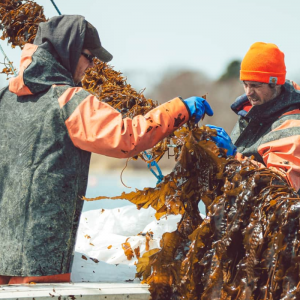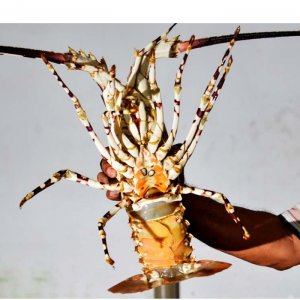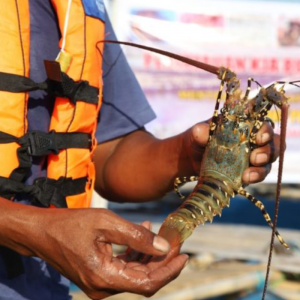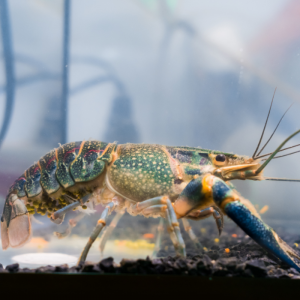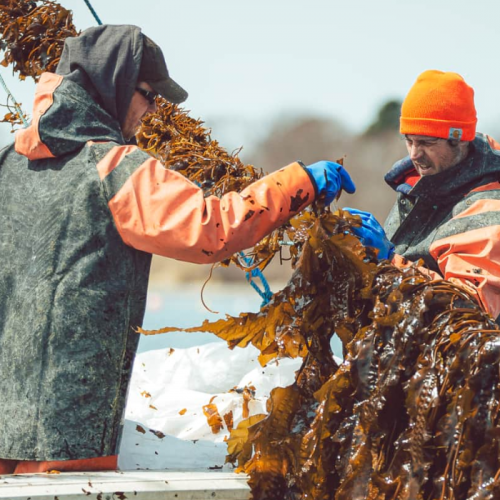
New England Lobster Fisheries Dip into Aquaculture
| Thu, 23 Jul 2020 - 08:03
After years of growth, lobster populations in the Gulf of Maine are declining due to warming waters, according to a study by the Gulf of Maine Research Institute. Fishers are looking to kelp farming to support their livelihoods and the environment.
“We have seen the lobster population just grow and grow [in past years],” Chris Townsend, a commercial fisher on Cape Cod, Massachusetts, tells Food Tank. But, he continues, “A lobster is very sensitive to temperature. As the water warms, they cannot come back to their traditional grounds where they drop their eggs off.”
Also read: Egg Sorting Technology Helps Pick Fish-Growth Winners
The Gulf of Maine is the fastest warming body of water, according to the National Oceanic and Atmospheric Association. In the late 1990s and early 2000s, gradual warming initially contributed to a boom in lobster populations, but warming waters, coupled with shell disease – a condition that makes lobsters susceptible to mineral loss – is already resulting in a decrease in lobster stocks.
Townsend has been working along the New England coast for 37 years. He now sells his catch to local fish markets, runs eco-tours, and continues to fish commercially. “You used to be able to go lobstering all the way down to South Jersey. Now the southern limit of lobsters is basically Rhode Island,” Townsend tells Food Tank.
With 80 percent of lobster in the United States coming from Maine, the dip in lobster populations threatens the state’s economy. In 2018, lobsters’ value contributed US$500 million to Maine’s economy and provided more than 35,000 jobs throughout the industry.
Also read: EMS, EHP Cases ‘have Doubled or Tripled’ at Southeast Asian Shrimp Hatcheries in 2019
“The lobster industry is strong, but our coast’s dependence on a single, wild species, particularly in the face of climate change, makes our coastal economy incredibly volatile,” Briana Warner, CEO and President of Atlantic Sea Farms, tells Food Tank.
Some fisheries are adopting conservation efforts to keep fertile female lobsters in the Gulf longer to increase lobster stocks; others are diversifying into marine aquaculture, the practice of breeding, raising, and farming species that live in oceans or estuaries.
Kelp farming, a form of aquaculture, produces commercial goods and restores habitats, according to Meg Chadsey, an expert on ocean acidification from the University of Washington. Kelp farming offers lobsterers a means to sustain their business and support the Gulf’s ecosystem.
“[Lobstering and kelp aquaculture] are symbiotic,” Warner tells Food Tank. “Kelp helps to locally mitigate some of the effects of climate change by removing carbon and nitrogen from the water and reducing ocean acidification. Kelp farmers are, in essence, improving the oceans and helping lobster populations thrive.”
Also read this: ‘Water-forecasting’ and Fish Farms Fed on Waste
Kelp farmers and lobsterers can use the same boats, basic gear, skills and license to operate, Warner tells Food Tank. With the lobster season in summer and fall, and the kelp farming season in the winter and spring, diversification allows coastal fishermen to supplement their income, says Warner. Once kelp is harvested, companies like Atlantic Sea Farms buy what their farmers produce and process it into products such as seaweed kraut, kimchi and salad.
Kelp’s combined industrial and consumer value projects to contribute US$2.2 million by 2028 with an exponential growth rate.
“In order to remain who we are and keep our maritime heritage, diversification of coastal incomes is essential,” Warner says. “Lobstermen are some of the best environmental stewards out there. There is tremendous opportunity for Maine’s aquaculture industry to grow—and for fishermen to be the leaders of this growth.”
Photo courtesy of New England Ocean Cluster
Source: Food Tank













